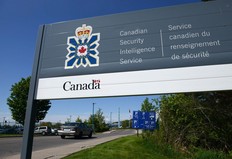DROVER: Canadians deserve a federal sunshine list

Article content
Canadian taxpayers foot the bill for government. That makes taxpayers the boss. And the boss has every right to know who’s getting paid how much.
But taxpayers are kept in the dark when it comes to the federal government. How many bureaucrats are pocketing six-figure salaries? Who’s raking in bonuses or cashing out unused vacation time?
No one knows. And that’s not an accident. It’s by design.
Unlike most provinces, the federal government has no sunshine law. That means there’s no legislation requiring Ottawa to publicly disclose the names, positions, salaries and benefits for its highest-paid employees. The people cashing the biggest taxpayer-funded paycheques remain anonymous. That’s unacceptable.
The Canadian Taxpayers Federation uses Access to Information requests to pry open the books. We’ve uncovered the fact that more than 110,000 federal bureaucrats now take home six-figure salaries. But we can’t get their names.
Meanwhile, provinces across Canada have sunshine lists. Ontario has had one since the 1990s. Alberta, British Columbia, Nova Scotia and others followed suit. These laws force governments to publish the names and pay of public servants making over $100,000 a year. In Manitoba, the threshold is $85,000.
From the list in Manitoba, taxpayers found out that the number of bureaucrats making over six-figure salaries increased by 83% since 2020. That’s important information.
It’s clear why sunshine lists are important: Taxpayers deserve transparency.
They deserve to know how their money is spent and whether it’s being used responsibly. They deserve to know if high salaries are based on merit or political connections. Without names, it’s impossible for the public to hold anyone accountable.
Bureaucrats and public sector unions often push back. They claim salary disclosure is an invasion of privacy. But when that argument was tested in court, it didn’t hold up.
In Newfoundland and Labrador, unions challenged the disclosure of the names of high earners. The case went all the way to the province’s Court of Appeal. And the court was clear.
“The public has a legitimate and significant interest in the identities of the people who receive public money,” wrote Justice Charles W. White. “Disclosing names promotes meaningful participation in the democratic process accountability.”
That ruling didn’t just settle the law in Newfoundland and Labrador. It offers a roadmap for the entire country. Sunshine laws work. They shine light on public spending, expose waste and help stop abuse.
Look at what happened in Newfoundland and Labrador after it introduced its sunshine list in 2016. The public learned that top executives at Nalcor, the Crown energy corporation, were making up to $270,000 more than comparable government employees.
But the problems didn’t stop at inflated salaries.
The sunshine list helped trigger an independent audit. That audit revealed Nalcor was spending nearly a quarter of a million dollars a year on booze, cigars, parties and golf fees. There were even cash gifts for staff. This happened year after year, all paid for by taxpayers.
Outrage followed. And eventually, so did action. The government shut down Nalcor and folded it into Newfoundland and Labrador Hydro, this time under tighter financial controls.
That’s the power of transparency.
When bureaucrats and politicians know the public is watching, they think twice before rubber-stamping a pay bump or billing taxpayers for their perks. When they know their names will be printed next to their paycheques, they must answer for it.
In Ottawa, there’s no accountability. Six-figure salaries grow quietly behind closed doors. Taxpayers keep paying more, but they’re not allowed to know who’s cashing in.
That needs to change. Canadians have a right to see how their money is spent. They have a right to demand transparency. They have a right to a federal sunshine law.
Let’s bring one to Ottawa.
-Devin Drover is general counsel for the Canadian Taxpayers Federation













Postmedia is committed to maintaining a lively but civil forum for discussion. Please keep comments relevant and respectful. Comments may take up to an hour to appear on the site. You will receive an email if there is a reply to your comment, an update to a thread you follow or if a user you follow comments. Visit our Community Guidelines for more information.